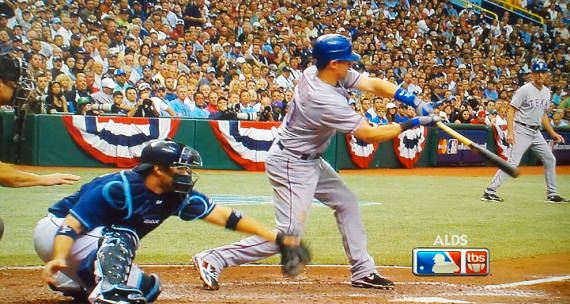
There is more hoopla and controversy involving the on-field product of baseball with umpiring, once again, in the middle of the controversy. Here is a more recent example of what I'm talking about. Photos, too!
Furor over misjudged calls grows with each passing game, and calls for replays, reviews, coach's challenges, multiple camera angles, robot umpires, and (sigh) electronic strike zones increase with each passing day. The idea of Bud Selig as Commissioner over this great sport scares me, but the idea he might give into the pressure scares me even more!
I hate speaking in hypotheticals and contingencies because there is always another twist to the scenario laid out, but for the purpose of this blog I will. Radio hosts on the FAN590 here in Toronto take calls from disgruntled baseball fans about blown calls, and some suggest electronic strike zones, and to my amazement some of the hosts agree with them! While on paper this seems like a good idea, no one lives on paper alone (is that thunder?).
Suppose there is an electronic strike zone in baseball; what questions must you answer before Chad Qualls throws that pitch to Michael Young?
1) What purpose will the strike zone serve?
2) Where is the strike zone?
3) Who will use the strike zone?
4) When will the strike zone come into use? Duration?
5) How will you implement the strike zone?
6) Why is there a strike zone?
Do you feel it, too? That feeling of knowing something no one else does? It gives you a sense of power, doesn't it? Maybe, however, that feeling is an illusion, for that information you guard is known to everyone including the batter! I call that feeling CORRUPTION.
The strike zone, and not the umpire, will judge whether Chad Qualls' pitch will be a ball or a strike. Until Qualls pitches, the ball is neither, so Qualls must decide whether the pitch will be a ball or a strike. Therefore, its "identity" will be a secret until Qualls releases the ball. A computer gauges the flight of the ball as it proceeds towards Michael Young, and then gives information to whom? A central computer, yes, but whose computer? The Rays' computer or the Rangers' computer? From there, who will know if Qualls' throw is a strike? Another umpire, the P.A. announcer, the managers, the fans, or perish the thought, the other players?

We must also know where exactly the ball is in the strike zone, too. How high or low in the strike zone is the ball? Dead center or across the street? Who decides how large or small the strike zone must be, for every player is different in body type and batting stance. My friend from softball (Hi In-Ting) and I love to mimic our favourite baseball players from David Ortiz's post-hit bat waggle to A-Rod's glare. The strike zone must account for every nuance and angle, so it would be fair to regulate an "average" strike zone to suit all players. However, for every player to assist in finding an average strike zone every player must know where the strike zone is.
Thus, there is a conundrum: If there is an electronic strike zone, then the strikeout will become all but extinct. If the pitcher can't win, then what will he throw? If the batter knows that pitch is a strike and misses, what will happen to him after the game when the coach asks him to come into his office? If the information about each pitch is for us, what human emotion will prevent the fan from supporting his player in the bottom of the ninth and yelling "DON'T SWING"?
At its core, replays, reviews, coach's challenges, multiple camera angles, robot umpires, and electronic strike zones IN BASEBALL have the same problems. Plus, the caveat lector is there is no discernable link or proof that play or pitch will force a certain result on the next play or pitch. On Qualls' next pitch, Michael Young hit a three-run homerun. There is no before the fact argument one can make to suggest one blown call "led to" a homerun. When things happen after the fact, however, we yell in the face of the umpires, we scream "Replay" from the stands, and we bombard local radio stations with angry calls for electronic strike zones.
Isn't baseball wonderful? Do you see? This is why we go to the game, why we watch with baited breath every hit & error, why we disagree with every borderline pitch, and why we call the radio stations the next morning. If the Yankees lost to the Blue Jays 5-3 because they lost 5-3 no one would watch, because there was no human connection to draw us into the game. If instant replay or electronic strike zones came into baseball to prevent errors, would we stop with just umpires? How about Cristian Guzman, or little league baseball players (The LLWS is using replay because grown-ups make mistakes, but kids don't. Televised LLWS bases its programming on errors and crying kids; what kind of message is that to send)?
No comments:
Post a Comment